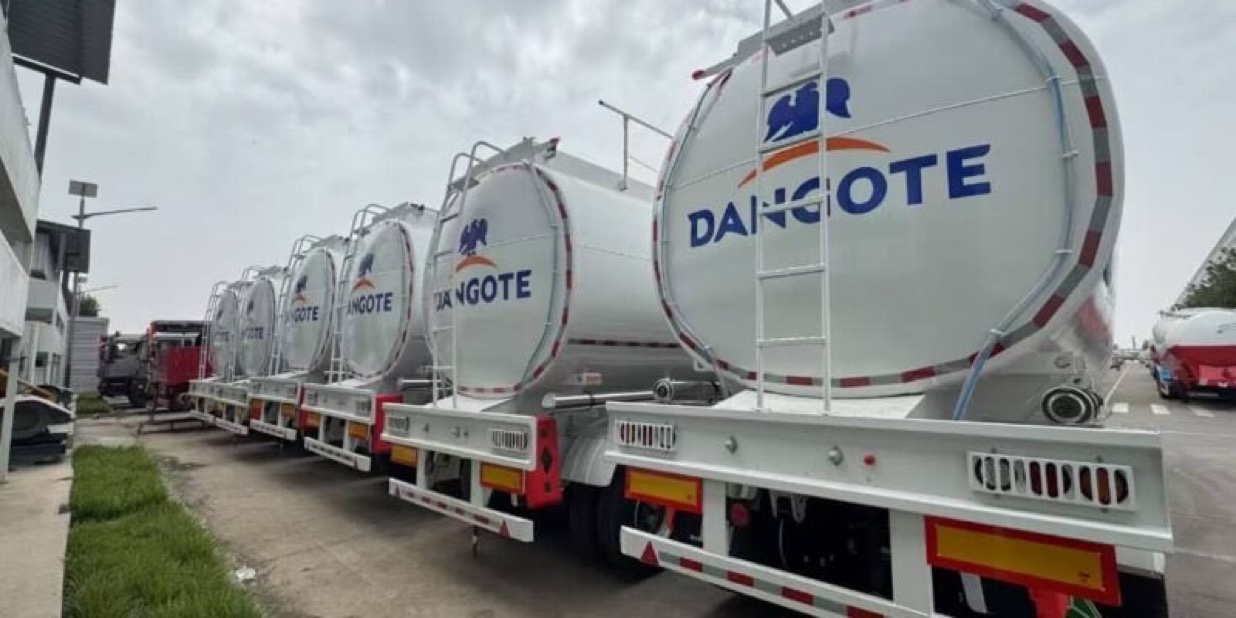
Dangote Refinery Finally Rolls Out Nationwide Fuel Distribution as Trucks Hit the Roads

In what many Nigerians are describing as a historic turning point in the nation’s energy sector, the Dangote Refinery has confirmed that the nationwide distribution of fuel by its fleet of trucks will officially commence today. After months of anticipation, speculation, and heated discussions around fuel availability, pricing, and the refinery’s capacity to deliver on its promises, the moment has finally arrived. Nigerians across the federation woke up to the breaking news that trucks bearing the Dangote brand are set to move refined fuel products from the massive facility to different states, sparking hope, excitement, and cautious optimism across the nation.
The Dangote Refinery, regarded as Africa’s largest and one of the world’s biggest single-train refineries, has been at the center of national conversations for several years. Since its commissioning, citizens and stakeholders have eagerly awaited the day when it would move beyond test runs, export-focused operations, and preliminary distributions, to begin supplying fuel directly to the Nigerian market on a large scale. Today marks that reality, as the management confirmed that its fleet of fuel trucks will begin loading and dispatching refined products to fuel stations nationwide.
Scenes at the refinery in Lagos this morning captured convoys of freshly branded Dangote trucks lining up for loading, with drivers and logistics managers coordinating what is expected to be one of the most extensive distribution rollouts in recent Nigerian history. Security operatives and officials were also on the ground to ensure smooth operations and avoid the chaos that often accompanies the first day of such monumental transitions. For motorists, commuters, and businesses that have struggled under the weight of fuel scarcity and skyrocketing pump prices, this development has sparked relief and cautious celebration.
For months, Nigerians have grappled with the high cost of petrol, irregular supply, and long queues at filling stations that paralyzed economic activities in many regions. The entry of the Dangote Refinery into nationwide distribution signals the possibility of a new chapter, where reliance on imported fuel may gradually diminish, and the country can begin to reclaim some control over one of its most vital resources. With the refinery’s massive capacity, experts believe it could not only meet domestic needs but also export to neighboring countries, positioning Nigeria as a regional hub for refined petroleum products.
However, the announcement has also raised questions. While Nigerians are hopeful, many wonder what the actual pump price will be and how quickly the refinery’s involvement will translate into tangible relief at filling stations. In recent weeks, debates have raged over pricing mechanisms, the role of government regulators, and whether the refinery would truly drive down costs in a market often clouded by opacity and monopolistic tendencies. Some analysts argue that while distribution has now begun, the real test will be in sustaining affordable prices across all regions of the country, especially in far-flung areas where logistics challenges and transport costs often add layers of inflation to fuel pricing.
Despite the concerns, the mood on the streets remains largely jubilant. In Abuja, Lagos, Kano, Port Harcourt, and other major cities, Nigerians expressed hope that this day marks the beginning of the end of endless fuel scarcity that has plagued the nation for decades. For transport operators, small business owners, and everyday commuters, reliable access to fuel is not just an economic issue but a lifeline that determines the rhythm of daily life. From buses that ferry workers to their offices, to generators that power homes and businesses, fuel remains at the heart of Nigeria’s survival. Dangote’s entry into nationwide distribution is therefore not just an industrial milestone but a deeply personal one for millions of Nigerians.
Reactions have also been pouring in from stakeholders across the oil and gas sector. Independent marketers have described the move as a game-changer that could stabilize supply and ease the pressure they have faced in sourcing products. Some, however, have cautioned that transparency and fair distribution must be ensured to avoid bottlenecks or the emergence of a new form of monopoly that could undermine the gains. Government officials have also welcomed the development, with some noting that it aligns with broader national goals of energy security, reduced import dependency, and economic diversification.
Economists are already predicting ripple effects across the economy. If fuel becomes more available and accessible, transportation costs could reduce, easing the pressure on food prices and inflation rates that have been driven upward in part by fuel challenges. The manufacturing sector, which has struggled with energy costs, may also experience relief, allowing more competitive production and potentially boosting job creation. For ordinary Nigerians, however, the expectation is simpler: they want to drive into filling stations, pay a fair price, and leave with a full tank, free of the stress and frustration that long queues and scarcity have caused for years.
It is also worth noting that today’s rollout has symbolic value beyond just economics. The Dangote Refinery has long been touted as a project of national pride, a symbol of Nigeria’s ability to build and operate world-class infrastructure in a sector that has historically been riddled with inefficiencies. For many, the sight of Dangote trucks moving out with refined fuel represents the fulfillment of a promise and a reminder of what is possible when ambition, resources, and determination align.
Still, Nigerians remain watchful. As much as the refinery’s trucks hitting the roads today is being celebrated as a breakthrough, citizens are aware of the complex dynamics of the oil and gas sector. From policy decisions to market forces and geopolitical influences, there are many variables that will determine whether this moment evolves into a long-term solution or becomes just another short-lived chapter in Nigeria’s fuel story. The next few weeks will therefore be critical in assessing how well the refinery manages nationwide distribution, whether it can sustain supply levels, and how Nigerians respond to whatever pricing regime emerges.
As the sun sets on this historic day, one thing is clear: Nigeria has entered a new phase in its fuel distribution journey. Whether this will mark the beginning of the end of scarcity or simply another evolution of the same old challenges remains to be seen. But for now, as Dangote trucks roll out of the refinery gates and begin their journey across the length and breadth of the nation, Nigerians are watching with bated breath, hoping that the promises of stability, affordability, and reliability will finally be realized.


